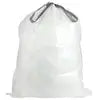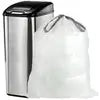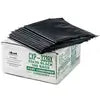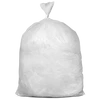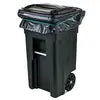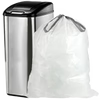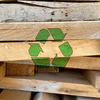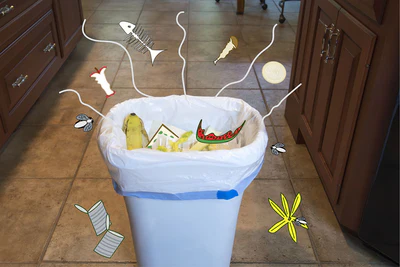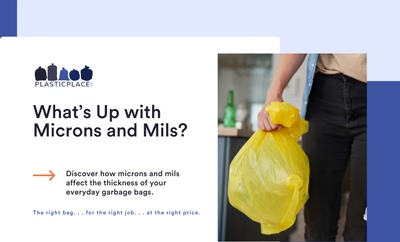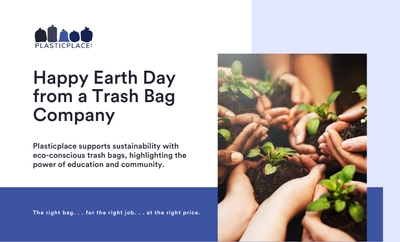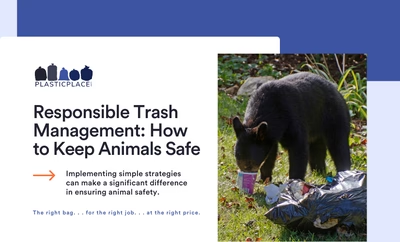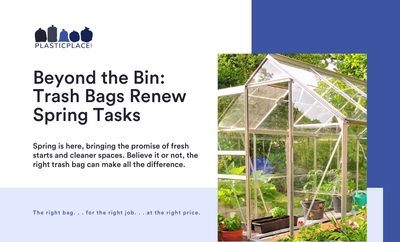From Instagram influencers to tiny cars running on electricity to the endless paper straws that have dissolved in our sodas, awareness campaigns encouraging us all to reduce our carbon footprint are pretty hard to miss. Trash is a reality of life. We create waste in the act of simply living. The fact remains that the average person produces nearly five pounds of trash per day. For perspective, this equates to over 1,800 pounds — nearly a ton — of garbage per person per year. We know now more than ever that excessive waste leads to serious and irreversible environmental concerns. Fortunately, even when purchasing plastic trash bags, there are steps you can take to help facilitate a more environmentally friendly lifestyle.
Reducing a global footprint is possible for everyone: from the average homeowner, to procurement professionals securing inventory for Fortune100 companies. Homeowners can upgrade to eco-friendly trash bags in the home. Businesses can opt to switch to brands that use compostable and low-waste packaging. Order Your Eco-Friendly Trash Bags Today!
Trash: The Good, Bad & How You Can Help the Ugly
For generations, humans have been creating and producing trash that has nowhere to go but back into the natural environment. Nearly 300 million tons of solid waste are generated per year in the United States alone, much of which winds up in landfills and waterways. Unfortunately, modern-day materials can take decades to decompose and cannibalize non-renewable resources. Some additional “costs” of trash pollution include: But all hope is not lost. With new awareness of how we can take steps to reduce our carbon footprint, trash management becomes an opportunity for you to contribute in a positive way.Reducing Your Carbon Footprint Through the Trash
Understanding which packaging materials and waste options are best for the environment is the first step in reducing your carbon footprint via the garbage you generate. However, there are a few other easy and important steps you can take to lessen your impact and help prevent climate change and pollution.
- Switch to Compostable (NOT Biodegradable) Garbage Bags — Make the switch to compostable garbage bags. These bags are made of natural materials that compost over time. But there’s one key caveat: Be sure to pay attention to labels when shopping for eco-friendly garbage bags! Unlike biodegradable garbage bags, compostable ones are regulated and made from materials that turn to compost over time, making them much more environmentally safe. In other words, compostable trash bags meet an industry standard that is government-approved. Just look for the designation of BPI-certified (from the Biodegradable Products Institute), which is your assurance that your compostable trash bags are doing what they claim to do – namely, enabling compostable material, such as lettuce, coffee grinds, nut shells, yard clippings and leaves, to compost naturally.
- Consider Composting Food and Yard Waste — Composting involves returning organic materials to the natural land to enrich the soil. When done properly, the practice allows you to turn all sorts of natural food and yard waste — fruit peels, vegetable scraps, leaves, dry pet food, yard clippings, plants, nuts, seeds and more — into an enriching plant fertilizer you can use to grow more food and waste. Thankfully, composting is relatively easy to learn and most people can create a small compost bin in their yard, patio or balcony at home without a huge investment.

- Recycle and Reuse as Much as Possible — We’ve all gotten used to recycling in our day-to-day lives, so much so that it has become like second nature. But to ensure you’re making the biggest impact, it’s important to make sure you’re recycling properly. Taking small steps, like using clearly labeled recycling bags in your business, will help ensure recyclable materials wind up in the recycling plant rather than the landfill. Pay attention to your municipality or trash company’s rules, as not all services recycle all materials. For example, if your city doesn’t recycle glass, you might want to keep your glass waste separate and take it to a facility where it’s accepted.
- Look for Compostable Packaging — As we already mentioned, compostable trash bags are an excellent way to ensure that you’re not contributing to the growing pile of slow-to-degrade waste in our landfills and oceans. Keep this in mind when purchasing consumables, as many companies have switched to packaging food, beverages and even cosmetics in entirely compostable packaging. Like with plastic bags, compostable is better than biodegradable in many cases because compostable packaging will break down in almost any environment, and it doesn’t require a special facility.
- Buy and Wear Natural Fibers — As you can see from the chart above, natural fibers, such as cotton and wool, are much quicker to degrade than synthetic ones, like nylon. Natural fibers also tend to have a subtler impact on the environment because they don’t require as many chemicals or water use during production. For the most environmentally friendly choice, choose organic wool or cotton apparel made with minimal harmful chemicals.
- Buy from ‘Zero Waste’ Brands — There is no such thing as living a zero waste lifestyle — at least not yet. However, some companies are working towards it through low-waste products that lessen waste and eliminate packaging altogether. For example, you can eliminate shampoo bottle waste by switching to a shampoo bar, similar to a bar of soap. Another good example of going low-waste is switching to a reusable razor rather than using disposable ones.
- Be Material Selective - Realize not all trash is made equal. - Not all trash is created or damages equally. The trash that is the most harmful to our environment is the trash that is the slowest to break down. That’s because it remains in an unnatural state in a natural environment and because it contains harmful toxins and chemicals that enter the atmosphere when it finally does degrade.
 Looking at the lifespan of certain kinds of trash can help you determine which products are the most eco-friendly and which are not so great for Planet Earth.
Looking at the lifespan of certain kinds of trash can help you determine which products are the most eco-friendly and which are not so great for Planet Earth.
- PAPER: 2 to 6 Weeks — Naturally, because they are typically made of plant-based materials, paper and cardboard are among the quickest products to break down in the landfill. Plus, they are highly recyclable and can be reused and transformed into new products over many years, making them among the more eco-friendly materials for packaging and consumer goods. For an even more eco-friendly option, choose paper products made at least in part using recycled materials (often labeled as post-consumer waste in paper).
- FOOD: 1 Month to 2 Years — Contrary to popular belief, not all food scraps will immediately decompose the minute you toss them into the compost bin. Actually, it takes some food waste months to degrade. For example, banana peels can take as long as two years to decompose entirely. On the other hand, food waste, such as the greens from your carrots or the core of your apple, may only take a couple of weeks to fully break down. These are all great candidates for your backyard compost pile (more on that below).
- ALUMINUM: 200 to 500 Years — Aluminum is a hardy, recyclable material that can last in a landfill or water for up to a couple hundred years. This makes it desirable for storing shelf-stable food, soda, beer, paint, chemicals and other liquids, but it makes it hard for the natural environment to process in a timely fashion. Because it’s stronger and lighter, aluminum is quickly replacing tin in packaging, but tin may be a bit better for the Earth, since it has a slightly shorter lifespan at about 50 to 100 years.
- GLASS: 1 Million Years — One of the best and worst things about glass is that it lasts, well, forever. In fact, the New Hampshire Department of Environmental Services reports that it could take up to one million years for a single glass bottle to break down entirely. That’s why there are 4,000-year-old glass artifacts from ancient Egypt that still exist today!
 Use Recycling Bags for All Your Recyclables
Use Recycling Bags for All Your Recyclables
Properly Managed Waste
The sum of many small changes can have a great impact - and waste management is no different. Whether you’re looking for 55-gallon trash bags for recycling, a compostable bag, or a higher quality bag to prevent double usage of plastics, Plasticplace.com offers products to help you manage your waste, and your best intentions to reduce your carbon footprint.
Image Credits:
pics of my life/Shutterstock.com
captureandcompose/Shutterstock.com
KaliAntye/Shutterstock.com
spwidoff/Shutterstock.com
Pinkyone/Shutterstock.com
 4.9 out of 5
4.9 out of 5  Mix & Match: Buy any two products for 10% off!
Mix & Match: Buy any two products for 10% off!













